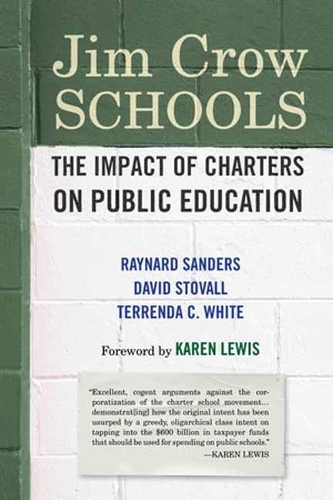
Twenty-First-Century Jim Crow Schools: The Impact of Charters and Vouchers on Public Education
(Paperback)
Publishing Details
Twenty-First-Century Jim Crow Schools: The Impact of Charters and Vouchers on Public Education
By (Author) Karen Lewis
By (author) Raynard Sanders
Beacon Press
Beacon Press
1st September 2018
United States
Classifications
General
Non Fiction
Educational strategies and policy
Independent schools, private education
Urban communities / city life
371.010973
Physical Properties
Paperback
160
Width 152mm, Height 229mm
Description
How charter schools have taken hold in three cities-and why parents, teachers, and community members are fighting back Charter schools once promised a path towards educational equity, but as the authors of this powerful volume show, market-driven education reforms have instead boldly reestablished a tiered public school system that segregates students by race and class. Examining the rise of charters in New Orleans, Chicago, and New York, authors Raynard Sanders, David Stovall, and Terrenda White show how charters-private institutions, usually set in poor or working-class African American and Latinx communities-promote competition instead of collaboration and are driven chiefly by financial interests. Sanders, Stovall, and White also reveal how corporate charters position themselves as "public" to secure tax money but exploit their private status to hide data about enrollment and salaries, using misleading information to promote false narratives of student success. In addition to showing how charter school expansion can deprive students of a quality education, the authors document several other lasting consequences of charter school expansion- .the displacement of experienced African American teachers .the rise of a rigid, militarized pedagogy such as SLANT .the purposeful starvation of district schools .and the loss of community control and oversight A revealing and illuminating look at one of the greatest threats to public education, Twenty-First-Century Jim Crow Schools explores how charter schools have shaped the educational landscape and why parents, teachers, and community members are fighting back.
Reviews
Twenty-First-Century Jim Crow Schools is both a social autopsy of catastrophic and fraudulent charter school initiatives in three American cities and a helpful guidebook for those of us engaged in the gathering struggle to save our public schools. Its a torch against the darkness, an antidote to cynicism and despair, and a map to move the movement forward. With this little book the forces determined to destroy public educationwith mobilized campaigns to disinvest and destabilize, displace and disenfranchisehave met a formidable opponent. As participatory democracy is repeatedly assailed, as the public space is systematically eroded and eclipsed, and as the very concept of something we might call a public is flogged by the powerful in favor of ruthless meritocracy and fanatical individualism, we who believe in freedom must rise up, reimagine, and revitalize the public square. Raynard Sanders, David Stovall, and Terrenda White have given us an essential tool in the fight ahead.
William Ayers, coauthor of You Cant Fire the Bad Ones!: And 18 Other Myths About Teachers, Teachers Unions, and Public Education
Excellent, cogent arguments against the corporatization of the charter school movement, which started as a way to have community- and teacher-led schools that served the needs of poor black and brown children . . . demonstrat[ing] how the original intent has been usurped by a greedy, oligarchical class intent on tapping into the $600 billion in taxpayer funds that should be used for spending on public schools.
Karen Lewis
Author Bio
Karen Lewis is president of the Chicago Teachers Union. The only National Board Certified teacher to lead a US labor union, she also serves as executive vice president to the Illinois Federation of Teachers and as vice president of the American Federation of Teachers. Raynard Sanders has more than forty years of experience in teaching, educational administration and community organizing. A former New Orleans high school principal, he was also the director of the Urban Education Graduate Program at Southern University at New Orleans. David Stovall is a professor of educational policy studies and African American studies at the University of Illinois at Chicago. Terrenda White is an assistant professor of sociology and education policy at the University of Colorado Boulder, and is a former elementary school teacher and co-coordinator of the People's Education Initiative in New York City.
